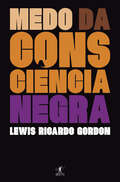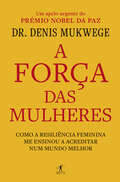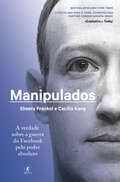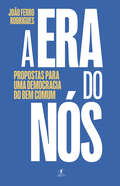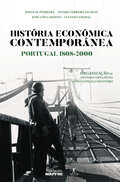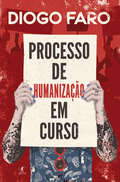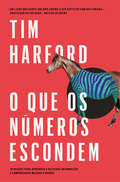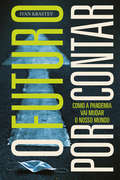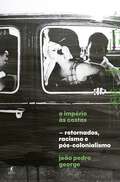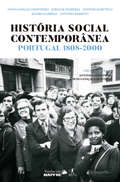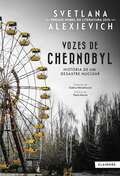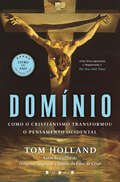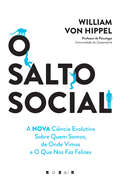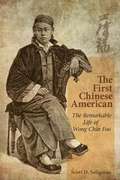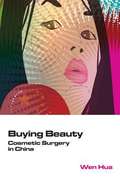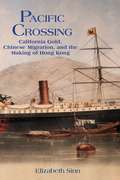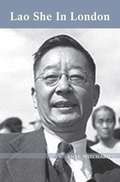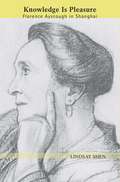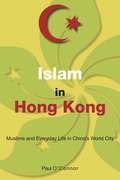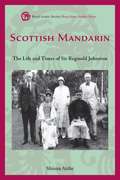- Table View
- List View
Medo da consciência negra
by Lewis Ricardo-GordonMedo da Consciência Negra constitui uma crítica social e filosófica brilhante que sublinha o papel fundamental das pessoas negras enquanto agentes da História e a necessidade de uma urgente revolução social. Segundo o filósofo afro-judeu Lewis Ricardo Gordon, herdeiro do pensamento de Fanon, ninguém nasce com uma consciência negra. A pandemia e a exposição global de episódios chocantes de brutalidade racista a que todos assistimos forçaram a sociedade a confrontar-se com o racismo que lhe é estrutural, um sistema sustentado na desumanização e na invisibilização da pessoa negra. Neste trabalho original e penetrante, Lewis Ricardo Gordon, um dos estudiosos mais importantes do Existencialismo Negro, guia o leitor pela história da Negritude racializada, pelos problemas que este tipo de consciência coloca e pelas inúmeras respostas criativas das comunidades negras e não-negras nas lutas contemporâneas por dignidade e liberdade. Partindo da sua experiência, na Jamaica, em criança, e nos EUA, já adulto, Ricardo Gordon recorre a inúmeros aspetos da cultura popular contemporânea, nomeadamente ao cinema e à música, para demonstrar como a celebração - e negação - da Negritude acontece em sistemas de conhecimento e de expressão cultural amplamente difundidos. Numa investida hábil por terrenos complexos e traumáticos, o autor disseca o narcisismo branco e expõe a perfídia no âmago de muitas discussões sobre raça e racismo, em particular com pessoas que declaram «não ver cores» e que se creem, por isso, extraordinárias. Extraordinário, declara, é conseguir ter uma vida normal numa sociedade dominada pela supremacia branca. Os elogios da crítica: «Poderoso . . . um dos mais eminentes estudiosos do racismo rasga os nossos horizontes com precisão intelectual e uma análise certeira.» Observer «As observações surpreendentes de Ricardo Gordon potenciam a nossa capacidade de interligar várias disciplinas criativas.» Literary Hub «Importante, forte… Uma análise sobre a razão por que as manifestações antirracistas representam um perigo tão grande para a estrutura de poder branco.» The Guardian «O amplo compromisso filosófico de Ricardo Gordon com o momento atual - as suas histórias e universalidades, os seus aspetos políticos e protestos, a sua cultura visual e sonora - relembram-nos de que o grande objetivo da luta pela liberdade Negra é, na verdade, a libertação de todas as pessoas.» Angela Y. Davis «Uma resposta intransigente ao pessimismo dominante. Pontuado por histórias pessoais, episódios engraçados e argumentos de força, este livro motiva os leitores a repensar as representações históricas de violência contra os negros, bem como o vocabulário que usamos, hoje, para falar sobre raça e racismo.» The Philosophical Quarterly
A força das mulheres: Como a resiliência feminina me ensinou a acreditar num mundo melhor
by Dr. Denis MukwegeDo Prémio Nobel da Paz e ativista dos direitos humanos, um testemunho transformador da força e resiliência das mulheres. A história de uma vida dedicada às mulheres e ao fim da violência sexual pela mão do médico ginecologista e obstetra Denis Mukwege. Do Nobel da Paz e reconhecido ginecologista e ativista pelos direitos humanos doutor Denis Mukwege, chega-nos um vigoroso apelo para lutarmos coletivamente contra o flagelo da violência sexual e aprendermos com o exemplo de resiliência e força das mulheres. Aquele a quem chamam «o homem que cura as mulheres», o ginecologista e cirurgião Denis Mukwege consagrou a sua vida às mulheres vítimas de violência sexual na República Democrática do Congo. Num lugar onde a violação é considerada uma arma de guerra, Mukwege move montanhas contra a violência mais monstruosa, muitas vezes colocando a própria vida em risco. Escrito na primeirapessoa, A força das mulheres é uma homenagem à coragem e à força daquelas que «carregam dentro de si a humanidade» e um convite à reflexão sobre o mundo que queremos ajudar a construir. Argumentando a importância de dizer «não» à indiferença e analisando as causa para o flagelo da violência sexual que assola o mundo, responsabiliza os governos no seu papel de reconhecer e compensar as vítimas e apela a que se quebre o tabu em torno da violação, construindo um sistema que apoie as mulheres e as incentive a denunciar a violência de que são alvo. Neste livro, Mukwege defende a urgência da construção de uma sociedade mais equilibrada, que envolva homens e mulheres numa verdadeira mudança de paradigma e na luta que deve ser a de todos, por justiça e por paridade. No centro de O poder das mulheres estão as vozes de todas as mulheres que, apesar do trauma e da violência, persistem e resistem e lutam. No final, a mensagem do prémio Nobel da Paz é clara: todos temos o potencial individual para fazer parte da mudança. «Chamo-lhe a Madre Teresa do Congo»Oprah Daily «Existem heróis de carne e osso - como o Denis Mukwege.»Michaela Coel «Chamo-lhe a Madre Teresa do Congo»Oprah Daily «O livro a que todos devíamos prestar atenção neste momento. As vozes das mulheres do Congo ecoam neste testemunho comovente do Dr. Mukwege sobre as causas e consequências da violência sexual.»Emma Watson, atriz e ativista «Existem heróis de carne e osso - como o Denis Mukwege.»Michaela Coel «Um testemunho importante e profundamente comovente sobre valor incalculável da dedicação de um homem ao trabalho humanitário.»Kirkus, starred review «Um registo vital do sofrimento e da resiliência das mulheres congolesas e uma exortação poderosa pelo fim da cultura da violação.»Publishers Weekly
Manipulados: A verdade sobre a batalha do Facebook pelo poder absoluto
by Sheera Frenkel Cecilia KangO livro que o Facebook não quer que leia. Sheera Frenkel e Cecilia Kang, premiadas jornalistas do New York Times, oferecem-nos um relato impressionante da queda em desgraça do gigante de Sillicon Valley. A verdade é muito mais complexa do que aparenta. Este livro é prova disso. BESTSELLER DO NEW YORK TIMES LIVRO DO ANO PARA A TIMES, COSMOPOLITAN, FORTUNE, FOREIGN AFFAIRS, WIRED «Explosivo.» Today Desde o escândalo que envolveu a Cambridge Analytica e a campanha de desinformação russa, que o Facebook tenta desviar atenções e esquivar-se a uma avalanche de controvérsias e inquéritos sobre a sua estratégia empresarial. Este gigante tecnológico, que se arroga a criação de um mundo hiperconectado onde todos usufruem de igual direito a expressar-se livremente, é, na verdade, uma voraz máquina de recolha de dados. Ao mesmo tempo, serve, sem escrúpulos, de plataforma a uma epidemia de desinformação tóxica e danosa cujas consequências estão à vista de todos. Muitos consideram que, nos últimos anos, o Facebook perdeu o rumo, que se desviou do seu intento original, o de aproximar pessoas. No entanto, esta minuciosa investigação das premiadas Sheera Frenkel e Cecilia Kang demonstra precisamente o contrário: os passos em falso dos últimos anos não são uma anomalia, antes consequências inevitáveis da arquitetura de um modelo de negócio impiedoso onde imperam as lutas de poder, enorme secretismo e operações ocultas. Sob a liderança de ferro do génio tecnológico de Mark Zuckerberg e do arquétipo da mulher-de-negócios-inspiradora Sheryl Sandberg, o crescimento ilimitado e o lucro desmedido têm sido as únicas constantes na evolução deste colosso. Esta não é a história de um cientista que perdeu o controlo sobre a sua criação. É a história real de duas pessoas que deliberadamente entregaram o seu império para servir de palco a criminosos e regimes políticos corruptos, com consequências devastadoras para todo o mundo. «Ler Manipulados dá-nos a mesma satisfação que contratar um detetive privado para investigar o cônjuge adúltero: confirma as nossas piores suspeitas.» New York Times Book Review «Fascinante. Os pormenores que dá a conhecer serão importantes no balanço em curso sobre o impacto das redes sociais na sociedade e na democracia.» Washington Post «Tanta informação nova neste livro sobre uma história que julgávamos compreender na totalidade. Afinal, parece que sabíamos muito pouco» Morning Joe «Fascinante.» People «Um registo precioso de tudo aquilo que correu mal, quando, onde e porquê, em especial nos últimos cinco anos.» CNN «Explosivo. Regista denúncias importantes sobre a vasta influência e erros reincidentes da empresa.» Today «Frenkel e Kang argumentam de forma inequívoca a necessidade de agirmos no sentido de eliminar de imediato do Facebook as mentiras, o ódio e a desinformação, se queremos preservar a democracia.» Associated Press «A verdade nua e crua, horrível, e feia, Manipulados, sobre o Facebook e Mark Zuckerberg, das jornalistas do New York Times, Sheera Frenkel e Cecilia Kank, é de arrepiar.» Luís Delgado, Visão «Não têm o Facebook instalado para proteger fontes e escreveram o bestseller que revela como Zuckerberg tomou decisões polémicas. Sheera Frenkel e Cecilia Kang querem que se saiba a "feia verdade".» Manuel Pestana Machado, Observador
Propostas para uma democracia do bem comum
by João Ferro RodriguesA ERA DO NÓSUm exercício de cidadania e progressismo por uma democracia do bem comumpor João Ferro Rodrigues. Uma leitura indispensável. Nas últimas décadas, apesar do ritmo intenso da globalização e do advento das redes sociais, que ligou pessoas de todo o mundo de uma forma inimaginável no século passado, a Humanidade tem caminhado no sentido de uma crescente atomização social. Vivemos mais sós, trabalhamos remotamente, , os núcleos familiares e sociais em que nos movemos são cada vez mais reduzidos e menos diversos. A maioria da população existe numa bolha restrita, pouco representativa da multiplicidade que o mundo abarca, e os outros, a sua realidade e experiências, são matéria de quase ficção. As crianças, em particular, têm um contacto extremamente limitado com a realidade do seu território, incomparavelmente menor do que tiveram as gerações anteriores. A partir desta constatação, João Ferro Rodrigues tenta resumir as causas desta bolha social, elencando as suas consequências no bem-estar de cada um de nós e no futuro da sociedade. E, num exercício de cidadania e progressismo, procura, acima de tudo contribuir com propostas concretas, com soluções práticas para que tenha início uma nova era. Uma era do bem comum democrático e inclusivo, impulsionadora de confiança nas nossas comunidades. Uma era do nós. «Nesta sua reflexão politicamente comprometida, João Ferro Rodrigues conduz-nos, num registo coloquial e sugestivo, através de referências atualizadas da teoria económica, da biologia, ou da história recente, para fundamentar a sua convicção quanto à urgência de recuperar os valores do bem comum. João Ferro Rodrigues enriquece corajosamente a sua reflexão com um elenco de propostas concretas de alcance transformador. Um contributo generoso, comprometido com o seu tempo, que merece ser escutado por decisores políticos e que interpela o cidadão comum.» Teresa Patrício Gouveia «Este livro chama-se apropriadamente A Era do Nós, mas bem que podia ser "Uma carta aberta aos jovens do meu país". O que aqui está é uma síntese notável, que guia o leitor ao longo da discussão dos dilemas sociais, económicos e políticos do nosso tempo, temperada com propostas exigentes, que rompem com os dogmas vigentes e com as clivagens políticas tradicionais. Tudo marcado por uma ideia chave - o homem superou as dificuldades sempre que levou mais longe a sua propensão comunitária -, por uma exigência crítica que escasseia e por um louvável otimismo, um dos ativos mais desvalorizado nos tempos que correm. Este é um livro progressista sobre os nossos tempos e com propostas viáveis para encararmos em conjunto os tempos que nos esperam.» Pedro Adão e Silva
História económica contemporânea: Portugal: 1808–2000
by Nuno Gonçalo Monteiro ANTÓNIO COSTA PINTOUma análise histórica global de um tema central do Portugal contemporâneo: a economia portuguesa dos últimos 250 anos. A economia esteve recorrentemente no centro das atenções da elite política portuguesa nos últimos duzentos e cinquenta anos. As designações foram variando. Mas desde meados do século XVIII que existiu a preocupação em colocar o país a par das «nações mais polidas da Europa». A noção do desfasamento e a ideia de encontrar meios de o superar atravessaram diferentes contextos e conjunturas, quase sempre associados a uma perceção de escassez material. Essa dimensão acabou por ser parte essencial dos projetos políticos e, até, das mudanças de regime. O público leitor e os estudiosos da sociedade e da política não podem prescindir dos indicadores económicos para a análise histórica mais global. Os territórios do «processo económico» possuem as suas metodologias e conceptualizações próprias, mas estas não devem impedir que os seus resultados possam ser comunicados e apropriados para a discussão e análise na esfera pública. Este é o objectivo primacial desta coleção que pretende aliar a legibilidade com o rigor sobre a História Contemporânea Portuguesa.
Um Quarto Só Seu
by Virginia WoolfCONSIDERADO UM DOS TEXTOS MAIS IMPORTANTES DO SÉCULO XX, UM QUARTO SÓ SEU MARCA UM MOMENTO FUNDADOR DO FEMINISMO MODERNO. UM ENSAIO MARCANTE DE UMA AUTORA INCONTORNÁVEL DO PENSAMENTO MODERNO, VIRGINIA WOOLF, AGORA NOS PENGUIN CLÁSSICOS. COM PREFÁCIO DE ANA LUÍSA AMARAL. «Tranquem as vossas bibliotecas se quiserem; mas não há portão, não há cadeado, não há ferrolho com que possam prender a liberdade do meu espírito.» Em 1928, Virginia Woolf foi convidada pela Universidade de Cambridge a dar, nos colégios femininos da instituição, uma palestra sobre mulheres e ficção. Com a frontalidade que o tema exige, Woolf resolve, sem subterfúgios, a equação: para escrever ficção, «uma mulher tem de ter dinheiro e um quarto só seu». Dito de outro modo, tem de ser livre. Versando sobre as condições materiais e sociais necessárias para que uma mulher possa, se assim o desejar, escrever e criar, e explorando os efeitos da pobreza e do constrangimento sexual na criatividade feminina, Virginia Woolf ofereceu ao seu auditório e a todas as gerações que se seguiram uma reflexão provocadora e estimulante sobre a condição da mulher e a alienação social a que foi, desde a Antiguidade, sujeita num mundo dominado por homens. Considerado um dos textos mais importantes do século XX, Um Quarto Só Seu marca um momento fundador do feminismo moderno, que devolve à esfera política uma luta antiga e justa: a da igualdade.
Processo de humanização em curso
by Diogo FaroO HUMORISTA, ACTIVISTA E CRONISTA DIOGO FARO ACREDITA QUE UM MUNDO MELHOR - PARA ELE E PARA TODOS NÓS - É POSSÍVEL. MAS, PARA ISSO, TEMOS DE ACTIVAR O PROCESSO DE HUMANIZAÇÃO EM CURSO. É URGENTE PENSAR O MUNDO DE OUTRA FORMA. Quem diz que não discute política, é porque vive num mundo à sua medida. No entanto, não é esse o caso para 99% da população mundial. O humorista, activista e cronista Diogo Faro acredita que um mundo melhor - para ele e para todos nós - é possível. Mas um mundo melhor não se materializa à nossa frente por mero desejo ou pondo em prática a «lei da atracção». Denunciar crimes e injustiças, ouvir e observar o que nos rodeia com sentido crítico, conhecer o passado, desenvolver a empatia e praticar a generosidade não são apenas pormenores de conduta pessoal, mas sim o que nos separa de uma tragédia iminente. «Se, para Camões, "amor é fogo que arde sem se ver", para os bilionários será deixar tudo a arder e nós a ver.» Confrontar o privilégio de alguns, exigir equidade e rejeitar a violência e a exploração são acções de que já não podemos fugir se queremos sobreviver. Este é o momento para entrar na luta e erguer a voz contra o racismo, a homofobia, o fascismo, a emergência climática, a violência de género e o neoliberalismo. A luta contra a desigualdade é a luta pela Humanidade. Neste Processo de humanização em curso, Diogo Faro demonstra que é possível ganhar consciência sem perder o sentido de humor.
A roda da felicidade
by Susete EstrelaAprenda a Nutrir-se Emocionalmente! Descubra como ser dono da sua saúde e dê um novo significado à sua vida! Com A Roda da Felicidade, Susete Estrela leva ao mundo a mensagem de que parte da solução para uma alimentação saudável pode estar fora do prato. Preparado para ir em busca do "seu saudável"? PORQUE ignoramos a nossa biografia quando queremos curar a nossa biologia? COMO podem eventos tristes da infância influenciar o nosso peso? QUANTO de si é peso emocional? QUEM das suas relações mais prejudica a sua saúde? QUAL a dieta emocional e nutricional que melhor serve a sua felicidade? A autora criou o conceito de "banquete da vida", no qual os alimentos podem ser servidos tanto num "prato emocional" como num "prato nutricional". Sempre que o primeiro está mais vazio, vingamo-nos no segundo. Com dicas valiosas e perguntas pertinentes desde a primeira página, este é o livro que o ajudará a introduzir mais alegria e satisfação na sua vida, mostrando que os eventos do passado, a nossa história, a nossa biografia influenciam em muito as escolhas alimentares do presente. Descubra ainda as dietas mais antigas e populares do mundo e como as pessoas mais longevas, felizes e saudáveis nunca se preocuparam com as dietas da moda nem com o "último" estudo científico. Atreva-se a ser feliz! E levante-se da mesa sempre que o amor deixar de ser servido.
O que os números escondem: 10 regras para aprender a decifrar informação e compreender melhor o mundo
by Tim HarfordOS NÚMEROS, QUANDO USADOS PELAS PESSOAS CERTAS, TÊM O PODER DE MUDAR O MUNDO. NOVO LIVRO DO AUTOR DO BESTSELLER O ECONOMISTA DISFARÇADO, TIM HARFORD, O QUE OS NÚMEROS ESCONDEM 10 regras para aprender a decifrar informação e compreender melhor o mundo «Um livro brilhante que nos ensina a ser cépticos sem sermos cínicos.» Professor Hetan Shah British Academy E se alguém lhe dissesse que existe uma ferramenta que lhe permitiria ver o invisivel? Poderia usá-la quando lê as notícias, para distinguir o que é importante do que é acessório, servir-se dela para perceber o seu lugar no mundo e na História, entender de onde viemos e para onde poderemos estar a caminhar. Poderia até usá-la para ser um consumidor mais consciente, levar uma vida mais saudável, votar de forma mais crítica. Enfim, uma ferramenta que contribuísse para que fôssemos pessoas mais sábias e perspicazes. O mundo seria mais nítido, como se estivéssemos a usar um par de óculos com raios-X. E se alguém lhe dissesse que essa ferramenta é a estatística? As estatísticas são uma parte do nosso mundo e da nossa vida. Cruzamo-nos com elas nos jornais e nas redes sociais, usamo-las em conversas entre amigos e para argumentar uma posição sobre determinado tema. No entanto, nunca duvidámos da sua veracidade tanto quanto agora. A estatística não é nenhum jogo de espelhos ou uma ferramenta manipuladora e manipulável usada para nos atirar areia para os olhos acerca da realidade das coisas. Pelo contrário, ajuda-nos a ler a realidade com maior clareza. As estatísticas, as boas estatísticas, ajudam-nos a ver coisas acerca do mundo e de nós mesmos que não poderíamos ver de outra forma. Com o rigor e bom humor a que já nos habituou, Tim Harford entra sem medos no mundo dos números e traz para a narrativa as vidas de formidáveis personagens como o falsificador de arte que enganou os nazis, a stripper que se apaixonou pelo congressista mais famoso de Washington e outros detectives de dados famosos, como John Maynard Keynes, Daniel Kahneman e Florence Nightingale. Através de 10 simples regras, com uma regra de ouro adicional, O que os números escondem ajuda-nos a manter a necessária presença de espírito acerca de nós mesmos, um aguçado sentido crítico e um nível saudável de cepticismo acerca da forma como os números são produzidos e apresentados, pois só assim poderemos olhar à nossa volta e ver, com uma clareza inédita, como o mundo faz sentido. Os elogios da crítica: «Numa altura em que a verdade é posta em causa, este é um livro poderoso, convincente e indispensável.» Caroline Criado Perez «Só Tim Harford para fazer da estatística do quotidiano algo tão fascinante e divertido.» Bill Bryson «Uma leitura lúcida, perspicaz e fundamentada. Deveria ser leitura obrigatória para todos os políticos e jornalistas - embora todos retiremos deste livro enorme prazer pela forma como ilumina qualquer sombra de dúvida e dissipa a névoa da ilusão.» Stephen Fry «Sábio, humano e, acima de tudo, esclarecedor. Ninguém explica estatística e números tão bem quanto Tim Harford.» Matthew Syed «Um génio a contar histórias que iluminam o mundo em que vivemos.» Malcolm Gladwell «Num mundo onde nos preocupamos constantemente com informações falsas, Harford escreveu um livro brilhante que nos ensina a ser cépticos sem sermos cínicos e a compreender que as estatísticas não são assustadoras, antes um tesouro inestimável para compreender a nossa sociedade.» Professor Hetan Shah, director da British Academy
O futuro por contar
by Ivan KrastevUma leitura indispensável para começar a compreender as consequências de um evento que marcará o rumo da humanidade nos próximos anos. «van Krastev é um dos pensadores mais fascinantes da actualidade. Um malabarista de paradoxos, um desafiador de crenças generalizadas. É possível discordar-se dele, mas nunca aborrecer-se com ele.»Washington Post « mundo sofrerá uma mudança profunda, não porque as sociedades assim o desejam ou por haver consenso quando à direcção da mudança, mas porque não será possível voltar atrás.» Poderá ser muito cedo para tirar conclusões definitivas acerca das reais consequências da pandemia do novo coronavírus que ainda atravessamos. Este acontecimento à escala global que, apesar de previsível e expectável, apanhou o mundo de surpresa, impôs transformações drásticas no modo de vida de alguns e expôs a necessidade absoluta de mudança para muitos mais. Além do medo, que gera desconfiança, ostracização, insegurança, clausura e outras formas quejandas de violência, a pandemia e a ameaça à segurança individual que ela representa forçaram alguns Estados a tomar acções urgentes e emergentes que, pela sua natureza de excepção, iluminaram contradições sociais, económicas e políticas latentes nas sociedades actuais. Neste ensaio de assinalável lucidez, Ivan Krastev, um dos mais conceituados analistas políticos da actualidade, expõe alguns paradoxos desconcertantes deixados a descoberto pela crise pandémica e analisa o impacto profundo que esta terá sobre a globalização, a cooperação internacional e a coesão nacional, o advento de novos autoritarismos, e o projecto europeu. Os elogios da crítica: «rastev é um dos intelectuais mais estimulantes do panorama actual europeu.»Financial Times «Ivan Krastev é um dos analistas políticos mais incisivos e elegantes que emergiram na Europa de Leste nos últimos anos.»Sunday Times «Ivan Krastev é um dos pensadores mais fascinantes da actualidade. Um malabarista de paradoxos, um desafiador de crenças generalizadas. É possível discordar-se dele, mas nunca aborrecer-se com ele.»Washington Post
O império às costas: Retornados, racismo e pós-colonialismo
by João Pedro GeorgeWiriamu. Descolonização. Compensações. Alcindo Monteiro. Integração. Racismo. Analisar o Portugal pós-colonial é urgente, e João Pedro George entregou-se sem medos a essa missão. Entre 1974 e 1981, Portugal acolheu e integrou cerca de setecentas mil pessoas chegadas dos antigos territórios ultramarinos portugueses no continente africano: Angola, Moçambique, Guiné, Cabo Verde, São Tomé e Príncipe.Numa época como aquela, política, social e economicamente instável, o extraordinário afluxo destes «retornados», como ficariam conhecidos, gerou uma enorme hostilidade em grande parte da população metropolitana, que se apressou a rotulá-los de imperialistas, racistas, colonialistas e reacionários. Muitos dos que regressavam à Metrópole, por sua vez, assumiram-se como críticos encarniçados da descolonização, um discurso que encontrou algum eco - um perigoso eco - em algumas forças políticas extremistas ou radicais, de pendor nacionalista e fascista. Os efeitos sociais e políticos deste súbito acréscimo populacional de 10% tiveram um impacto profundo nas estruturas institucionais do país e na consolidação da sua jovem democracia. Em O Império às Costas, João Pedro George relaciona e explora as diferentes vertentes da descolonização portuguesa, para assim demonstrar, por um lado, que a integração dos retornados foi um dos processos que mais influenciou a atual configuração da sociedade portuguesa, e, por outro, que a herança do colonialismo continua, ainda hoje, a fazer-se sentir na vida cultural, social e política do país. joao pedro george; descolonizaçao portuguesa; pos-colonialismo; historia de portugal; retornados; indemnizaçoes retornados; IARN; alcindo monteiro; racismo em portugal
História Social Contemporânea: 1808-2000
by António Costa Pinto Nuno Gonçalo MonteiroUm retrato analítico e cronologicamente fundamentado da história social contemporânea portuguesa. Indispensável para compreender o passado e o presente do país. Ao longo da época contemporânea, sobretudo do século XX, foi aos indicadores sobre a sociedade que mais se recorreu quando se pretendeu destacar o "atraso" ou desfasamento português face a outros países europeus. Invocava-se então a elevadíssima mortalidade infantil, as altas taxas de analfabetismo ou a persistente emigração para identificar as arrastadas maleitas portuguesas, cuja responsabilidade se atribuía, sobretudo, ao regime político, em particular ao Estado Novo.Este volume procura responder a essas interrogações, oferecendo um retrato analítico e cronologicamente fundamentado da história social contemporânea portuguesa, cujos primórdios foram marcados pelo colapso imperial, pela independência do Brasil e pela vitória do liberalismo em 1834, depois de arrastados conflitos. Tratou-se não apenas de uma rutura política, mas também do triunfo de uma nova conceção da organização da sociedade. Os contextos e limites da sua concretização, bem como as reações que suscitou, constituem, em boa medida, a matéria tratada neste volume.Ao longo de cinco capítulos, debatem-se os impactos sociais das mudanças políticas ou, mais exatamente, de que forma se combinaram com as transformações e as continuidades na sociedade portuguesa. História Social Contemporânea: Portugal 1808-2000, um projeto conjunto da editora Objectiva, uma chancela da Penguin Random House, e da Fundação Mapfre, conta com a coordenação e organização dos professores António Costa Pinto e Nuno Gonçalo Monteiro, ambos investigadores na área de História no Instituto de Ciências Sociais da Universidade de Lisboa (ICS-UL). Ete volume conta ainda com a participação dos professores Jorge M. Pedreira professor da Faculdade de Ciências Sociais e Humanas da Universidade Nova de Lisboa, António José Telo, professor catedrático na Academia Militar de Lisboa, Álvaro Garrido, docente da Faculdade de Economia da Universidade de Coimbra e investigador do Centro de Estudos Interdisciplinares do Século XX da mesma Universidade, e António Barreto, investigador emérito do Instituto de Ciências Sociais da Universidade de Lisboa e ex-presidente da Fundação Francisco Manuel dos Santos.
Fábrica de Mentiras: Viagem ao mundo das fake news
by Paulo PenaUma viagem chocante e reveladora ao mundo das fake news. Uma reflexão importante sobre o jornalismo e a sua função mediadora na sociedade, contra a manipulação, o ódio e a mentira. «A desinformação é um processo, uma sequência de actos concebidos por alguém com o objectivo de manipular as convicções do maior número possível de pessoas.» Um pouco por todo o mundo, as infames fake news têm-se revelado um verdadeiro entrave à democracia e uma incubadora de ódio social. Seja no Brexit, na eleição de Trump ou de Jair Bolsonaro, o efeito da desinformação e das mentiras propagadas como se notícias fossem pode ter sido determinante para decidir o voto de muitos eleitores. Em Portugal, onde 63% das pessoas afirmam receber as notícias que as mantêm informadas através das redes sociais, mentiras meticulosamente plantadas no mural certo, à hora certa podem fazer a diferença num momento decisivo. Mas como chegámos aqui? Quem fabrica estas «notícias» e por que o faz? Numa investigação de fôlego em coordenação com organismos internacionais, o premiado jornalista Paulo Pena lança-se numa viagem aos bastidores das fake news, nacionais e internacionais, para nos mostrar que a era da desinformação chegou e que está nas nossas mãos combatê-la. Sobre o trabalho do autor: «Ao serviço do Diário de Notícias, o jornalista de investigação Paulo Pena levou a cabo uma investigação meticulosa onde expõe as ligações de algumas notícias falsas e sites de desinformação a plataformas de redes sociais, bem como os métodos utilizados e quem os financia.»Oxford Reuters Intitute, relatório anual de 2019 «Um recente trabalho de investigação jornalística (novembro 2018) levado a efeito pelo Diário de Notícias, e seguido por outros órgãos de comunicação social, teve por motivação identificar sítios onlinededicados à produção de notícias falsas, bem como as suas páginas correspondentes na rede social Facebook. Expôs ainda as motivações de alguns deles, bem como alguns esquemas de financiamento utilizados por este tipo de criadores de conteúdos. A partir deste retrato foi possível criar uma ideia acerca do alcance e potencial de circulação que este tipo de produtores de conteúdos atingem na rede social que em Portugal é mais utilizada pelos cidadãos para se informarem, conforme indicam a estudo mencionado acima.»Entidade Reguladora para Comunicação Social, no relatório A Desinformação - contexto europeu e nacional «Em Janeiro de 2018, alarmada com a disseminação de desinformação em torno do referendo britânico ao Brexit e as consequências da corrida russa ao Facebook durante as eleições de 2016 nos EUA, a União Europeia convocou um grupo de trabalho de "alto nível" cheio de especialistas dos media e da academia - assim como representantes da Google, Facebooke Twitter - para analisar o problema e recomendar soluções. No outono passado, esse grupo criou um "código de práticas" acordado, incluindo um compromisso de tornar a publicidade política mais transparente. Mas, segundo uma pesquisa do Investigate Europe, as propostas foram diluídas depois de o Facebook e a Google pressionarem, nos bastidores, os membros do grupo.»Columbia Journalism Review
Vozes de Chernobyl: História de Um Desastre Nuclear
by Svetlana AlexiévichVozes de Chernobyl é a obra mais aclamada de Svetlana Alexievich, Prémio Nobel de Literatura 2015, tida como o seu trabalho mais duro e impactante. A 26 de abril de 1986, Chernobyl foi palco do pior desastre nuclear de sempre. As autoridades soviéticas esconderam a gravidade dos factos da população e da comunidade internacional, e tentaram controlar os danos enviando milhares de homens mal equipados e impreparados para o vórtice radioativo em que se transformara a região. O acidente acabou por contaminar quase três quartos da Europa. Numa prosa pungente e desarmante, Svetlana Alexievich dá voz a centenas de pessoas que viveram a tragédia: desde cidadãos comuns, bombeiros e médicos, que sentiram na pele as violentas consequências do desastre, até às forças do regime soviético que tentaram esconder o ocorrido. Os testemunhos, resultantes de mais de 500 entrevistas realizadas pela autora, são apresentados através de monólogos tecidos entre sicom notável sensibilidade, apesar da disparidade e dos fortes contrastes que separam estas vozes. Vozes de Chernobyl, livro vencedor do prestigiado National Book Critics Circle Award, é uma das obras mais aclamadas de Svetlana Alexievich, e tida como o seu trabalho mais duro e impactante. «Uma grande escritora que utiliza as entrevistas como matéria-prima para construir textos empolgantes sobre a condição humana.» Miguel Esteves Cardoso, Público «Em que categoria enquadrar Svetlana Alexievich? Reportagem? Testemunho documental? Ensaio jornalístico? Romance de não-ficção? É literatura em carne viva.» José Carlos Fernandes, Time Out «Se o leitor tem curiosidade sobre o futuro, sugiro que leia este livro com caráter de urgência. A Chernobyl de Alexievich é um lugar de extremos e do desconhecido, palco das consequências da tecnologia.» The Telegraph
Os Judeus Não Contam: Como as Políticas Identitárias Deixaram Ficar Mal uma Identidade em Particular
by David BaddielComo as políticas identitárias falharam com uma identidade em particular Vivemos num momento de intensa consciencialização sobre as minorias, em que pessoas que consideram estar do lado certo da História lutam ativamente contra formas de discriminação como a homofobia, a deficiência, a transfobia e, sobretudo, o racismo. David Baddiel defende, porém, que há um tipo de racismo que tem sido deixado de fora dessa luta: o antissemitismo. Neste livro, numa brilhante combinação de observações perspicazes, experiências pessoais e críticas acutilantes, o famoso comediante e escritor apresenta a sua perspetiva sobre como as políticas identitárias e não discriminatórias têm falhado com uma identidade em particular e descreve como os judeus não contam como uma verdadeira minoria - e por que motivo deveriam contar. Um pequeno ensaio sociopolítico que convida a uma reflexão sobre a desigualdade no tratamento das minorias. «Uma crítica convincente e devastadora.» The Sunday Times
Domínio: Como o Cristianismo Transformou o Pensamento Ocidental
by Tom HollandUm livro fundamental que mostra como a revolução cristã mudou o mundo O Cristianismo é o legado mais influente e duradouro da Antiguidade, e o seu surgimento constitui a revolução mais radical da história do Ocidente. O impacto da religião cristã deixou a sua marca em todos os campos do desenvolvimento humano. Consequentemente, apesar do número crescente de pessoas que abandonam esta fé na atualidade, viver num país moderno é viver numa sociedade cujos instintos e tradições têm profundas raízes cristãs. Neste livro, o historiador Tom Holland relata como chegámos ao presente e como a mente ocidental foi moldada num contexto histórico mais amplo. Numa análise reveladora que se estende desde a invasão persa da Grécia em 480 a. C. até às atuais crises migratórias na Europa, o autor explica por que motivo o Cristianismo foi e é uma força revolucionária e de que modo transformou radicalmente o que significa ser humano. «Se os grandes livros nos encorajam aolhar para o mundo de um modo completamente novo, então Domínio é, sem dúvida, um grande livro.» The Sunday Times
Não É Só Sangue: Uma Conversa Sobre o Ciclo Menstrual
by Patrícia LemosO ciclo menstrual é reflexo da sua saúde. Aprenda o que o seu corpo lhe está a querer dizer. Além das questões menstruais, o livro ajudará as mulheres a compreender o importante conceito de literacia de corpo: que se traduz na capacidade de interpretarmos os sinais que o corpo nos dá e capacitar-nos no sentido de nos permitir tornarmo-nos uma autoridade nos nossos próprios assuntos. Porque é que precisa de um livro sobre ciclo menstrual? O mais provável é que seja diferente do que aquilo que lhe contaram. Para algumas pessoas, a menstruação é a chatice que aparece de quando em vez; para outras, não incomoda assim tanto. Mas para todas as pessoas que menstruam: o ciclo menstrual é informação. Patrícia Lemos, educadora para a saúde menstrual e fertilidade, ajuda-nos a compreender o nosso ciclo menstrual e a olhá-lo como um indicador de saúde, sempre — e não apenas quando se pensa em ter bebés. Neste livro, descobrirá que:· No ciclo menstrual, o mais importante é invisível aos olhos. · Ovular faz-nos falta, mesmo quando não queremos engravidar. · A expressão do período (cor, consistência, cheiro, duração) fornece pistas sobre a nossa saúde.· Num pico de fertilidade, as probabilidades de conceção são de cerca de 20% a 25% a cada ciclo. · A TPM tem tratamento, e não é suposto existir. · A síndrome dos ovários poliquísticos é uma condição crónica, não se cura com a pílula e não se diagnostica apenas com uma ecografia.· A endometriose é uma condição de saúde séria e estrogénio-dependente. · Infertilidade e subfertilidade são coisas distintas.
O Salto Social: A Nova Ciência Evolutiva Sobre Quem Somos, de Onde Vimos e o Que Nos Faz Felizes
by William von HippelUm olhar novo e provocador à nossa espécie que fornece novas pistas sobre quem somos, porque fazemos o que fazemos e como podemos viver uma boa vida. Um olhar novo e provocador sobre a nossa espécie. A psicologia humana está repleta de contradições: esforçamo-nos para alcançar os nossos objetivos, mas quando somos bem-sucedidos, a nossa felicidade é passageira. Desejamos que os nossos amigos tenham uma boa vida, mas sentimos inveja se for boa demais. Reclamamos de chefes difíceis, mas não costumamos ser melhores quando assumimos a liderança. Estas incoerências podem parecer irracionais, mas cada uma é fruto da evolução com o propósito de servir uma função vital nas nossas vidas. De facto, os aspetos mais fundamentais da nossa psicologia foram moldados permanentemente pelo «salto social» que os nossos antepassados deram ao migrarem da floresta tropical para a savana. Na sua luta pela sobrevivência, deram prioridade ao trabalho em equipa e à sociabilidade em detrimento das proezas físicas, criando um tipo inteiramente novo de inteligência. Mesclando antropologia, biologia, história e psicologia com ciência evolutiva, O Salto Social é um olhar novo e provocador à nossa espécie que fornece novas pistas sobre quem somos, porque fazemos o que fazemos e como podemos viver uma boa vida. Os elogios da crítica: «Esqueça os bens materiais. A chave da felicidade pode estar onde menos espera. Repleto de conhecimento sobre o caráter humano, este livro faz-nos refletir sobre o que verdadeiramente importa.» — Kirkus Reviews
The First Chinese American
by Scott D. SeligmanChinese in America endured abuse and discrimination in the late nineteenth century, but they had a leader and a fighter in Wong Chin Foo (1847-1898), whose story is a forgotten chapter in the struggle for equal rights in America. <P><P>The first to use the term 'Chinese American,' Wong defended his compatriots against malicious scapegoating and urged them to become Americanized to win their rights. A trailblazer and a born showman who proclaimed himself China's first Confucian missionary to the United States, he founded America's first association of Chinese voters and testified before Congress to get laws that denied them citizenship repealed. <P><P>Wong challenged Americans to live up to the principles they freely espoused but failed to apply to the Chinese in their midst. This evocative biography is the first book-length account of the life and times of one of America's most famous Chinese - and one of its earliest campaigners for racial equality.
Buying Beauty
by Wen HuaCosmetic surgery in China has grown rapidly in recent years of dramatic social transition. Facing fierce competition in all spheres of daily life, more and more women consider cosmetic surgery as an investment to gain "beauty capital" to increase opportunities for social and career success. Building on rich ethnographic data, this book presents the perspectives of women who have undergone cosmetic surgery, illuminating the aspirations behind their choices. The author explores how turbulent economic, socio-cultural and political changes in China since the 1980s have produced immense anxiety that is experienced by women both mentally and physically. This book will appeal to readers who are interested in gender studies, China studies, anthropology and sociology of the body, and cultural studies.
Pacific Crossing
by Elizabeth SinnDuring the nineteenth century tens of thousands of Chinese men and women crossed the Pacific to work, trade, and settle in California. Drawn initially by the gold rush, they took with them skills and goods and a view of the world which, though still Chinese, was transformed by their long journeys back and forth. They in turn transformed Hong Kong, their main point of embarkation, from a struggling infant colony into a prosperous international port and the cultural center of a far-ranging Chinese diaspora. Making use of extensive research in archives around the world, Pacific Crossing charts the rise of Chinese Gold Mountain firms engaged in all kinds of transpacific trade, especially the lucrative export of prepared opium and other luxury goods. Challenging the traditional view that the migration was primarily a "coolie trade," Elizabeth Sinn uncovers leadership and agency among the many Chinese who made the crossing. In presenting Hong Kong as an "in-between place" of repeated journeys and continuous movement, Sinn also offers a fresh view of the British colony and a new paradigm for migration studies.
Lao She in London
by Anne WitchardLao She remains revered as one of China's great modern writers. His life and work have been the subject of volumes of critique, analysis and study. However, the four years the young aspiring writer spent in London between 1924 and 1929 have largely been overlooked. Dr Anne Witchard, a specialist in the modernist milieu of London between the wars, reveals Lao She's encounter with British high modernism and literature from Dickens to Conrad to Joyce. Lao She arrived from his native Peking to the whirl of London's West End scene - Bloomsburyites, Vorticists, 'avant-gardists' of every stripe, Ezra Pound and the cabaret at the Cave of The Golden Calf. Immersed in the West End 1920s world of risque flappers, the tabloid sensation of England's 'most infamous Chinaman Brilliant Chang' and Anna May Wong's scandalous film 'Piccadilly', simultaneously Lao She spent time in the notorious and much sensationalised East End Chinatown of Limehouse. Out of his experiences came his great novel of London Chinese life and tribulations - 'Mr Ma and Son: Two Chinese in London' ('Er Ma', 1929). However, as Witchard reveals, Lao She's London years affected his writing and ultimately the course of Chinese modernism in far more profound ways.
Knowledge Is Pleasure
by Lindsay ShenFlorence Ayscough - poet, translator, Sinologist, Shanghailander, avid collector, pioneering photographer and early feminist champion of women's rights in China. Ayscough's modernist translations of the classical poets still command respect, her ethnographic studies of the lives of Chinese women still engender feminist critiques over three quarters of a century later and her collections of Chinese ceramics and 'objets' now form an important part of several American museum's Asian art collections. Raised in Shanghai in an archetypal Shanghailander family in the late nineteenth century, Ayscough was to become anything but a typical foreigner in China. Encouraged by the New England poet Amy Lowell, she was to become a much sought after translator in the early years of the new century, not least for her radical interpretations of the Tang-dynasty poet Tu Fu. She later moved on to record China and particularly Chinese women using the new technology of photography, turn the Royal Asiatic Society's Shanghai library into the best on the China Coast and build several impressive collections featuring textiles, Ming and Qing ceramics. By the time of her death Florence Ayscough has left a legacy of collection and scholarship unrivalled by any other foreign woman in China before or since. In this biography, Lindsay Shen recovers Ayscough for posterity and returns her to us as a woman of amazing intellectual vibrancy and strength.
Islam in Hong Kong
by Paul O'ConnorMore than a quarter of a million Muslims live and work in Hong Kong. Among them are descendants of families who have been in the city for generations, recent immigrants from around the world, and growing numbers of migrant workers. Islam in Hong Kong explores the lives of Muslims as ethnic and religious minorities in this unique post-colonial Chinese city. Drawing on interviews with Muslims of different origins, O'Connor builds a detailed picture of daily life through topical chapters on language, space, religious education, daily prayers, maintaining a halal diet in a Chinese environment, racism, and other subjects. Although the picture that emerges is complex and ambiguous, one striking conclusion is that Muslims in Hong Kong generally find acceptance as a community and do not consider themselves to be victimised because of their religion.
Scottish Mandarin
by Shiona AirlieColonial administrator, writer, explorer, Buddhist, and friend to China's last emperor, Sir Reginald Johnston (1874-1938) was a distinguished sinologist with a tangled love and family life that he kept secret even from his closest friends. Born and educated in Edinburgh, he began his career in the colony of Hong Kong and eventually became Commissioner of the remote British leased territory of Weihai in northern China. He travelled widely and, during a break from colonial service, served as tutor and advisor to Puyi, the deposed emperor. As the only foreigner allowed to work in the Forbidden City, he wrote the classic account of the last days of the Qing Dynasty--Twilight in the Forbidden City'.
